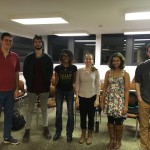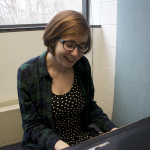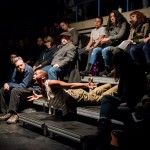If you know absolutely nothing about medieval music, perhaps it brings to mind images of weary monks singing gloomy Gregorian chants, or wannabe troubadours congregating at a Renaissance fair. Harder to imagine is half a dozen Swatties singing in Italian about orgasms. Welcome to the Early Music Ensemble, one of the newest classes born from the Fetter Chamber Music Program.
The Fetter program allows small groups of students to audition to form their own, small music ensembles. If accepted, they are given a coach from the Music and Dance Department and funded for a full semester, culminating in a final performance. This semester, one of these groups is the Early Music Ensemble, led by Professor James Blasina.
“I think it’s a very important opportunity for students to do music like this. Early music is still very influential today, in anything from pop to Western classical music …For example, you can’t understand Bach if you don’t understand Gregorian chants,” explains Professor Blasina.
Reuben Gelley Newman ’21 first heard of the Ensemble from a friend and has developed a deeper appreciation for Early Music since joining. “I love music and sang some madrigals in high school chorus…[medieval music] doesn’t get as much attention as more modern classical music from the traditional canon…people don’t do it as much, so it’s mostly smaller groups where we know each other better.”
Having a small, close group is essential to the early musical experience. As Professor Blasina explains, “[Much] early music wasn’t meant for performance, it’s really used in private or religious contexts, so we’re deliberately a smaller group. [Secular music] was often sung in private contexta— you might have a few after dinner drinks, gather up, and sing these polyphonic songs called madrigals. They often deal with romance and sex, sometimes very frankly.”
Madrigals do not fit in with what we might imagine as Early Music- they are fun and playful and very often sexual. Natasha Nogueira ’18, a member of the Ensemble, recalls one particular madrigal sang by the Ensemble. “[The madrigal] talks about dying a thousand times but it’s actually about orgasms — [it’s] very weird and fun to be singing that. My favorite is maybe ‘Sumer is icumen in’ (‘Summer is coming,’ in Middle English.) I heard it as a kid on a CD, and I’m really excited to be singing it now. It’s a kind of music everyone can enjoy.”
Gelley Newman’s favorite is based on a Latin poem, written to commemorate the death of Lorenzo da Medici. As Gelley Newman explains, it is “…a very sad song of grief and mourning, the only one of the repertoire that’s sad…there’s something very powerful in its evocations of grief, dark and mysterious.”
Professor Blasina’s favorite also deals with mourning – a Monteverdi madrigal recounting the grief of a lover at his beloved’s grave. “There are sonorities in these madrigals you don’t hear again until the 19th century…it’s anachronistic in the best way. Another great one, not part of our repertoire, is a Monteverdi duet aria, L’incorazzione di Poppea, the story of Nero and Poppea. It’s so beautiful, but we know the end of their story [Nero allegedly beat Poppea to death while she was pregnant], so it’s also creepy. So you’re left feeling very uncomfortable. And it would have been sung by a female singer and a castrato, with very similar voices, so that opens the door for lots of gendered interpretations.”
Grief, love, lust, discomfort, all are brought to life by the Ensemble. It’s a far cry from what one might associate with the “Dark Ages,” and overturned my own preconceptions about Middle Ages culture and arts. The Early Music Ensemble’s final performance is scheduled in April; the campus and Swarthmore community is invited to come and experience how music over seven hundred years old can reflect experiences and emotions essential to the human experience.
Emilie Hautemont ’20








